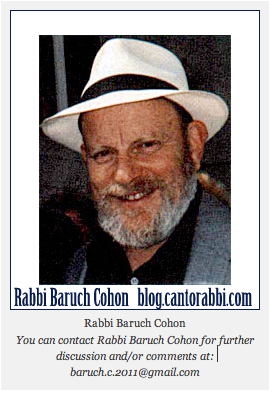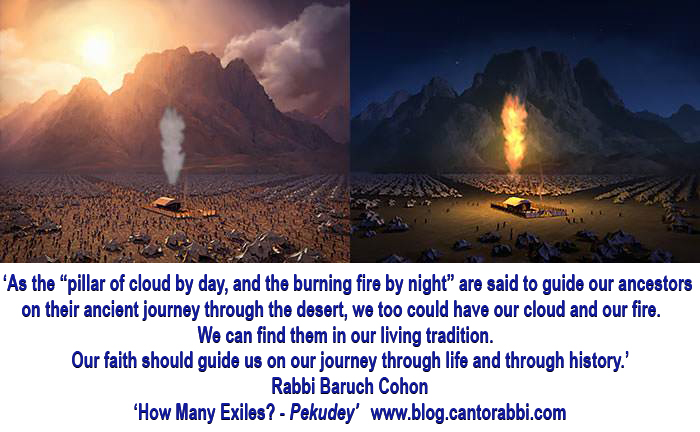
HOW MANY EXILES? – Pekudey – Ex.38 -40 by Rabbi Baruch Cohon
The Book of Exodus concludes with an elaborate description of the process of assembling the Tabernacle and initiating its ritual. After a year of wandering in the desert, on the first day of the first month of their second year out of Egypt, the people of Israel has its portable headquarters – a home for its worship and a guide for its journey. The last section of this reading tells us that the Divine presence shows by day in a cloud resting on the Tabernacle, and at night by a fire burning inside. When the cloud rises, the people move on, extending their progress toward the Promised Land. When the cloud settles, they camp.
Here we have a physical, visual symbol of Jewish destiny. As the “pillar of cloud by day, and the burning fire by night” are said to guide our ancestors on their ancient journey through the desert, we too could have our cloud and our fire. We can find them in our living tradition. Our faith should guide us on our journey through life and through history.
The great commentator Nachmanides, the Ramban,writes that Exodus is the book of the first exile — first of four exiles scheduled for Israel. This exile was decreed in the 15thchapter of Genesis, where the people’s redemption from exile was also predicted. But that exile was not finished until the Tabernacle was complete and Divine glory could dwell among the people.
Four exiles: Egypt, Babylon, Rome and Spain. Did the independence of the State of Israel end the 4thexile?
Maybe not. Maybe we are still in the 4thexile, without an invasion, without an inquisition. Maybe we are in exile from ourselves. Right now. Maybe we find too many of our people wilfully turning their backs on the pillar of cloud and the pillar of fire.
No maybe about it.
Many years ago I found myself discussing the concept of a Messiah with a Hebrew school class. I asked them who did they think the Messiah would be. It was a 12-year-old boy who answered: “I think the Messiah is all of us. We can save ourselves.”
Good answer, Billy. Indeed we need to save ourselves. We need to end our exile from ourselves and from each other. We need to share the basic beauty of our heritage, the potent power of our Torah, over and above our quarreling opinions. There is so much in Judaism to share. We don’t have to agree on every interpretation, but we must somehow join in the goal of “saving ourselves.” In all the many parts of the world we live in, and in all the rival religious movements and political parties we sponsor, we can still find each other. We must. Together, together, we can find that pillar of fire and follow it into a future we can share.
No 5thexile!


